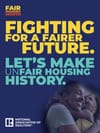ALBANY—New York State released a 247-page report on May 5 that paints a damning picture of Fair Housing issues in the state, including the significant extent of housing segregation and racial discrimination in regions across the state.
The “Fair Housing Matters NY” report authored by the New York State Homes and Community Renewal’s Fair and Equitable Housing Office and Office of Research and Strategic Analysis revealed that approximately a third of New Yorkers live in highly white/non-white segregated counties, with 44% of downstate New Yorkers living in highly segregated counties. Another disturbing finding from the report is that approximately 95% of Black/African American households in New York live in a county that is highly segregated between Black/African American and white households.
“The work of undoing historic, systemic, and entrenched segregated living patterns and eliminating discrimination in housing will always be a priority of my administration,” Gov. Hochul said. “The findings in this report show that confronting these inequalities will require an aggressive multi-faceted approach. I look forward to working with our partners at the federal, state, and local levels to take the bold actions necessary to foster more diverse communities and create and preserve affordable housing for more New Yorkers.”
The report found not only segregated housing patterns throughout New York, but also that access to community resources, poverty, and substandard housing conditions consistently fall along segregated racial and ethnic lines, state officials noted.
The report’s findings also underscore other forms of segregation and inequitable access to resources beyond those centering on race and ethnicity. For example, state officials noted that older adults, those with limited English proficiencies and those with disabilities, also find themselves concentrated in areas of poverty with access to fewer community resources.
Other report findings of note were:
• Two-thirds of white households own their homes, compared to only a third of Black/African American households and a quarter of Hispanic/Latinx households that own their homes.
• Women and children experience poverty at higher rates in all regions of the state than men and adults.
• Households containing a member with a disability are much more likely to be classified as extremely low-income.
A particularly troubling finding from the public engagement connected with the study was that among the many factors described as contributing to these living patterns included “racism in real estate and lending, zoning and land use laws, gentrification and displacement, and the concentration of affordable and government-supported housing in distressed and disinvested areas of the state.”
New York State Homes and Community Renewal Commissioner RuthAnne Visnauskas said of the report’s findings, “Affirmatively furthering fair housing also means tearing down arbitrary barriers to housing that are experienced disproportionately by communities of color, immigrants, victims of domestic violence, and other protected and vulnerable New Yorkers. Under Gov. Hochul’s leadership, we will continue to analyze and combat systemic inequities and housing discrimination that prevent too many New Yorkers from building wealth, accessing opportunities, and living in safe, affordable homes in the communities they choose.”
The report recommended eight Fair Housing goals and a plethora of other action items geared at creating more access to housing through a combination of market-driven, regulatory, financial, and administrative changes.
Those goals included:
• Build upon opportunities for wealth creation through affordable home ownership.
• Increase access to suitable affordable housing for those with disabilities.
• Create more affordable housing with avenues for community support.
• Remove barriers to housing by addressing redlining and disinvestment in neighborhoods.
• Increase access to affordable housing by addressing barriers to housing choice.
• Increase access to affordable housing through fair housing education and enforcement.
• Promote development of affordable housing in areas where land use and development regulations provide barriers.
• Implement environmental justice principles in state-funded housing in response to climate change.
The “Fair Housing Matters NY” report follows a New York State Department of Financial Services report released in December 2022 that found continued racial disparities in mortgage lending practices on Long Island, in Rochester and in Syracuse. The report was part of an ongoing statewide inquiry into redlining and followed another DFS study that identified redlining and other forms of housing discrimination by mortgage lenders, particularly non-depository lenders, in majority-minority neighborhoods in Buffalo.
In August 2022, Gov. Hochul and Attorney General Letitia James acted to stop illegal and discriminatory housing practices at three Long Island real estate brokerages that were discriminating against Black, Hispanic, and other homebuyers of color, announcing settlements with the brokerages totaling more than $115,000. Those actions stemmed from a Newsday investigation in November 2019.
In Dec. 2021, Gov. Hochul signed into law nine fair housing bills designed to combat discriminatory housing practices that persist around the state. These bills included legislation to increase penalties for unlawful housing discrimination and creation of a fund to support fair housing testing. Another expands required training for real estate professionals on subjects such as the legacy of segregation, unequal treatment, and historic lack of access to housing opportunities.
Earlier this year the governor announced a $2.2-million expansion of New York’s Fair Housing Testing Program designed to root out discrimination in home rental and sale transactions. New York is partnering with six nonprofit organizations, including Westchester Residential Opportunities, Inc. of White Plains, to deploy undercover testers to act as potential renters and home seekers. The expansion will increase the state’s ability to proactively investigate suspected housing discrimination and to enhance education and outreach efforts on fair housing rights and requirements to landlords, tenants, real estate professionals, and local governments.
Marlene Zarfes, Executive Director of Westchester Residential Opportunities said the organization was not surprised with the report’s findings.
“Westchester Residential Opportunities (WRO) deeply appreciates the governor’s commitment to fighting discrimination and systemic inequities in housing, both of which exacerbate a critical lack of affordable and accessible housing in Westchester,” she said. “It lays bare what we have seen as a 55-year-old fair housing organization. We are hopeful, however, that this report is the start of addressing the imperative of increasing home ownership by Blacks/African Americans and Hispanic/Latinx, augmenting fair housing education and enforcement to prevent discrimination, and increasing accessible and affordable housing for people with disabilities.”









